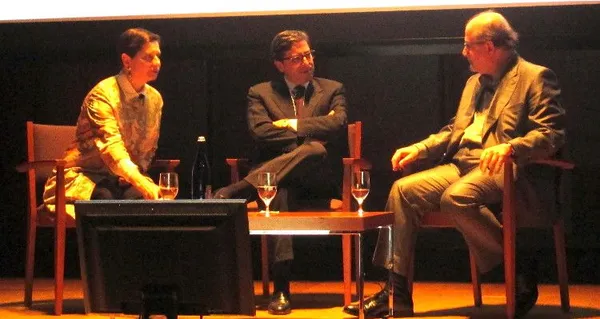 |
| Isabella Rossellini and Salman Rushdie with Antonio Monda. Photo: Anne-Katrin Titze |
The 2014 Le Conversazioni literary festival celebrating the relationship between art, architecture, literature, and film took place at the Morgan Library & Museum on Thursday, May 8 in New York. Artistic Director of Le Conversazioni, Antonio Monda, discussed with Isabella Rossellini and Salman Rushdie films that influenced their lives and work.
Isabella Rossellini chose Charlie Chaplin's The Circus (1928), Roberto Rossellini's Stromboli (1950), A Trip To The Moon (Voyage Dans La Lune,1902) by Georges Méliès and Billy Wilder's Some Like It Hot (1959).
Salman Rushdie picked François Truffaut's Jules Et Jim (1962) and three of the most influential science fiction movies from the second half of the 20th century, two of them directed by Stanley Kubrick. Dr Strangelove (1964) and his 2001: A Space Odyssey (1968). His fourth selection was Ridley Scott's Blade Runner (1982).
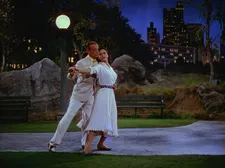 |
| Dancing In The Dark from The Bandwagon |
Eight clips, four each, plus one from the moderator at the end, accompanied the sold-out event.
This time, three trends dominated their choices. Four were science fiction films. Music featured prominently, sung by Jeanne Moreau and a computer voice and danced to by Fred Astaire, Cyd Charisse, and Charlie Chaplin on a high wire. We were entertained by Le Tourbillon De La Vie, Daisy and Dancing In The Dark. Animals were conspicuous in the sequences shown, including pesky playful capuchin monkeys, tuna, which in the meantime has entered the endangered species list, a white dove of the future and a carriage horse, soon of the past.
When asked by Monda about the first films of their lives, both guests said they couldn't recall. As she was the daughter of Roberto Rossellini and Ingrid Bergman, moviemaking was always around little Isabella. Rushdie, who grew up in Bombay, mentioned that he had two aunts who acted in movies and an uncle who wrote screenplays and that film was "always there".
Here is what they had to say about the films they chose.
The Circus
Charlie Chaplin, balancing on a high wire, fabricates the most impossible stunts until he realises that he lost his harness. As if on cue, a gang of capuchin monkeys comes to his "rescue", which consists of giving him kisses, slinging their tails around his face and pulling down his pants while he tries not to fall into the arena. "I don't have to explain why I like it," Rossellini said, and added that she has always been "very interested in animals and animal behavior." The uproarious Circus is not often shown and she mentioned that Chaplin was not "very fond of the film because of the memory of [making] it," which was very troublesome. Rushdie, asked by Monda if he was "more of a Buster Keaton person," responded that it's good that "one doesn't have to choose, really."
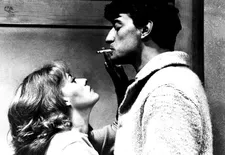 |
| Jules Et Jim |
Jules Et Jim
Jeanne Moreau sings Le Tourbillon De La Vie to Oskar Werner and Henri Serre and Rushdie quietly sings along on the stage watching. He chose Jules Et Jim, because it was the first Truffaut film for him and because he sees the French New Wave as a "point of colossal revolution in cinema". This scene he selected in order to tell us the anecdote of a birthday lunch for the 70-year-old Moreau in London, given by the French Embassy, during which he asked her if the song was an old song or had been written for the film. "No, it was written for me," she replied, and by a man she dumped. "Do you still think of it as the song that your ex-boyfriend wrote or is it the song from Jules Et Jim?" he asked. She replied "It is the song from the movie. You see, so I dumped him twice." Monda, in an excursion about Henri-Pierre Roché, whose semi-autobiographical novel inspired the film's love triangle which included the German translator of Marcel Proust, describes the characters as "trapped in a moment of happiness."
Rushdie summed up beautifully the paradox that "it is essentially a sad film but the experience of watching it, is watching a joyous film". Even the deadly car scenes at the end reminded him of slapstick moments.
Stromboli
Directed by her father Roberto Rossellini and starring her mother Ingrid Bergman, Rossellini's choice is not only a private family affair, it reflects the changes in the world since 1950. The singing and praying fishermen pulling in their nets during a long and arduous scene that always makes me think of the hunting sequence in Jean Renoir's Rules Of The Game (1939), although this is so clearly about survival, are taking from a sea of plenty. When Rossellini watched the retrospective of her father's films at MoMA in 2006, it struck her how much Italy had changed. "One of the things that was most shocking is that tuna is [now an] endangered species to the Mediterranean. The abundance that was in the film, in one generation, in my lifetime, has disappeared."
On another family note, she explained that her mother was the only actress in the film and the others were told to count instead of saying any lines, quite a change for someone accustomed to working with Cary Grant or Spencer Tracy. Stromboli was financed by Howard Hughes. "Mama left David Selznick and Howard wanted to make a film with her," but didn't get along at all with the director. Isabella recounts years later taking a TWA flight and how completely furious her father was. TWA was owned by Hughes, and the Rossellinis "never, ever, ever, ever" used it, except that one time.
TWA is now extinct.
Speaking of Italian films, Rushdie called Federico Fellini "the most useful" for him in dealing with childhood and adolescence. The very ordinary childhoods "would become these epic, operatic experiences."
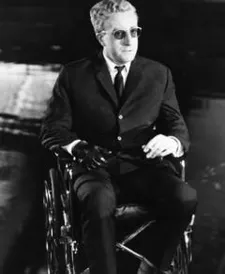 |
| Dr Strangelove |
Dr Strangelove
"I love precious bodily fluids," Rushdie said about a line from the scene he chose and pointed out how contemporary he thinks the film is. "Don't you think he looks like Dick Cheney?," Rushdie asked. A discussion about Sterling Hayden's name (Gen. Jack Ripper or Gen. Jack D. Ripper?) turned into a discussion of Peter Sellers' kidnapping of Lolita away from Vladimir Nabokov. Rushdie calls Dr Strangelove "one of the most brilliant screenplays ever written."
In the center of the program, Monda usually asks his guests about a classic, well-loved movie they despise. This time, he was more specific, asking Rushdie about his least favorite Kubrick movie and Rossellini about any family movies she was less fond of than others. "Barry Lyndon (1975) because of Ryan O'Neal in the 18th century," was Rushdie's pick, and then he added Eyes Wide Shut (1999) as the worst. As a student, Rushdie said, he loved most of Ingmar Bergman, but now the allegorical fantasy of The Seventh Seal (1957) falls flat for him.
Picking up on the Bergman cue, Rossellini makes an excellent point about Autumn Sonata (1978), the film Bergman made with her mother. The story of a woman "who dedicated her life to her career and therefore neglected her children." Now seeing this film, Rossellini says "you just see that, no, it was [Ingmar] Bergman having a problem. I look at it now not as the truth but as Bergman's truth." Monda's provocative question if there was a film of her father's she didn't like was diplomatically thwarted by Isabella towards the subject of financing films and a quote by her father: "It was always more important what you wanted to say, than how you said it."
A Trip To The Moon
A look at the marvelous, hand-coloured 1902 science fiction film was selected by Rossellini because she said, "Méliès became my inspiration, my reference," in her own filmmaking of the Green Porno series, because she felt so "very intimidated by technology." Her camera does not move, backgrounds are drawn and avoidance of technical issues became her style going back to the beginnings of cinema. The discussion shifted to Martin Scorsese's Hugo (2011) that tells the story of the groundbreaking filmmaker who ended up selling toys at a railroad station.
"As a teenager, I was obsessed with science fiction," Rushdie said. It faded eventually, because many of the books were badly written and because the "women were always awful." The only choice was between "the babe or the lab technician." Before Star Wars, science fiction movies were low budget B-movies.
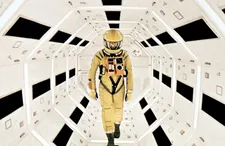 |
| 2001 |
2001: A Space Odyssey
Rushdie chose the dismantling of the memory terminal to show us - "I can feel it, my mind is going," "Daisy, Daisy, give me your answer, do…" because for him it is "a long very slow murder sequence - what's being murdered is a computer which itself is a murderer." It is one of the early cinematic reflections on the relationship of man and machine. An obsession of mankind that always fascinated him was to "look at the future when it has become the past," and he gave George Orwell's 1984, written in 1948 as an example we now look at from a thirty year difference. He mentioned the fact that the Pierre Cardin jumpsuits from the late Sixties weren't really in style in the early 21st century, and Monda added that Kubrick changed the computer's name from Athena to HAL, the three letters of the alphabet preceding IBM.
A shout out to Close Encounters Of The Third Kind (1977), called Steven Spielberg's best by Rushdie and Monda, brought us back to François Truffaut for an instant. Isabella Rossellini mentioned one of the classes she took about animal intelligence and said that the question of a continuum between our intelligence and the animals' was illustrated by a scene from Kubrick's 2001, "a moment that separates the monkey from the human."
Some Like It Hot
It is impossible not to smile with and at Marilyn Monroe beaming at Tony Curtis by the sea, while he is dressed in his best Cary Grant outfit, a bucket of shells by his feet. "You play the market?" he asks "No, the ukulele." The film remains a complete knock-out and Rossellini hit the nail on the head when she compared it to a favorite fairy tale that you want to hear over and over again. "I bet you're also gentle and helpless," Monroe's character interprets his glasses and her comedic timing is perfect, said Rossellini, "maybe after Charlie Chaplin one of the best clowns ever."
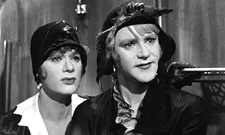 |
| Some Like It Hot |
The clip showed Jack Lemmon only for a brief moment, and all three on stage agreed that the film is unimaginable without Lemmon who was not Wilder's first choice, nor his second. Monda surprised many when he said that Jerry Lewis and Danny Kaye were higher up on the casting list. Rushdie reminded us not to forget Wilder's brilliant co-screenwriters, I.A.L. Diamond for eleven films, including Some Like It Hot and Charles Bracket before him who collaborated on 13 films until they split over Sunset Boulevard (1950).
Blade Runner
Changed from the novel called Do Androids Dream Of Electric Sheep? by Philip K. Dick, which the film is loosely based on, the title Blade Runner remains a mystery. Rushdie, who seems to collect lists of perplexing titles, enjoyed comparing it to Reservoir Dogs, a movie with "no reservoirs and no dogs. No references to reservoirs or dogs." A white dove, Rutger Hauer with a nail through his hand, beneath them the city that forever predicted the future, language becomes poetry. Harrison Ford learns what it means "to be a slave" and about all those moments which will be "lost like tears in rain."
Rushdie makes the comparison to what was previously discussed and states that Ridley Scott is clearly "not interested in the screenplay." His film all depends on the visuals, so much so that "every science fiction city, every futuristic metropolis invented now, comes from Blade Runner." Rushdie talked about when many years ago he worked in advertising and made a Clairol Loving Care commercial with Nicolas Roeg. They had a conversation about Ridley Scott's films and Roeg told him "if you come out of a movie theatre and there were six images burnt into your memory that you'll never forget - that's a good film."
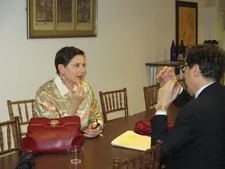 |
| Isabella Rossellini in the Le Conversazioni green room hearing Antonio Monda's choice is The Bandwagon before Salman Rushdie arrives. Photo: Anne-Katrin Titze |
The evening ended on a high note with one of my all time favorites, the Dancing In The Dark sequence with Fred Astaire and Cyd Charisse exploring each other and a glorious studio-built Central Park. Monda's choice of Vincente Minnelli's The Bandwagon (1953) sent us back out into the world humming. Thankfully, there were no carriage horses waiting outside the Morgan Library.
In 2013, Marina Abramovic, Daniel Libeskind, Julie Taymor and Jeffrey Eugenides joined Antonio Monda in Le Conversazioni at the Morgan Library & Museum.
Le Conversazioni 2014 concludes in New York with Zadie Smith and Patrick McGrath on November 6.





















